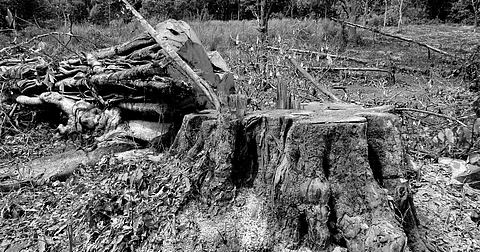

THE SUPREME COURT TODAY was informed by the Telangana government that it is preparing a holistic development plan for the Kancha Gachibowli forest area - located in Hyderabad’s IT hub - where large-scale felling of trees had earlier taken place.
Senior Advocate Abhishek Manu Singhvi, appearing for the Telangana government, told a bench of Chief Justice of India B.R. Gavai and Justice Vinod Chandran that in compliance with earlier court directions, all tree-cutting activities had been halted.
“Court shouldn’t have any concern about that. Now we want to come up with a much larger plan for our forests, lakes... It will take some time,” Singhvi said.
CJI Gavai welcomed the move and asked the state to submit a “good proposal” for the Court’s consideration. “If you come with a good proposal, we will withdraw all suo motu proceedings against the state and give you a real compliment... We want the environment to be protected,” CJI remarked.
Recording the submission, the Court observed, “Time and again, the Court has said it is not against development, but development has to be sustainable development. While carrying out development activities, the interest of the environment and wildlife must be protected by ensuring mitigating and compensatory measures.”
The Court granted six weeks for the state to place its plan before it. The bench was hearing a suo motu matter concerning large-scale tree felling in the Kancha Gachibowli forest area.
Earlier hearings had witnessed the Court caution the Telangana government that development did not mean forests could be destroyed “overnight with bulldozers,” warning of stern action if no restoration decision was taken.
It had ordered the Wildlife Warden of Telangana to protect wildlife affected by deforestation across 100 acres, and barred the felling of even a single tree.
The bench had also warned that officers responsible for the deforestation could be sent to a “temporary prison” at the site if the state sought to justify the destruction. It ordered that until further directions, no activity be carried out at the site except for protecting existing trees.
The land, located in Hyderabad’s IT hub, has become contentious amid public concern over loss of green cover and wildlife habitat. University of Hyderabad students have been protesting against its auction, demanding it be transferred to the university.
The Supreme Court has consistently held that while economic growth is vital, it must align with the principle of sustainable development, a concept first embedded in Indian environmental jurisprudence through cases like Vellore Citizens’ Welfare Forum v. Union of India (1996), which adopted the precautionary principle and the polluter pays principle.
In Narmada Bachao Andolan v. Union of India (2000) and T.N. Godavarman Thirumulpad v. Union of India (1996), the Court emphasised that forests and wildlife are national assets, and their protection is a constitutional obligation under Articles 48A and 51A(g).
The Kancha Gachibowli matter falls within this established judicial framework, where the top Court has repeatedly intervened to halt environmental harm, insisting that any development project incorporate adequate mitigation, compensatory afforestation, and wildlife safeguards.